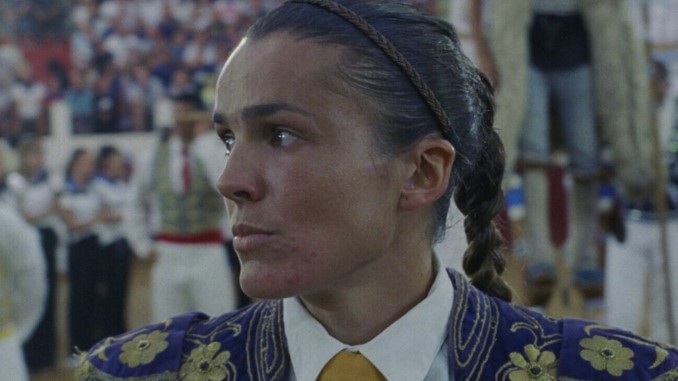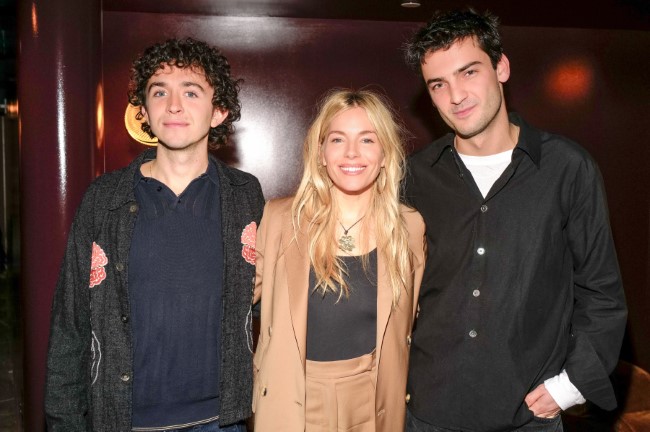Marion Filmmakers on Tangling with Stampeding Bulls, Awards Buzz and Hollywood Royalty
Photos courtesy Marion, Madison McGaw/BFA.com
“Dig in!” Joe Weiland commands, gesturing to the pint of Stella Artois in front of me. It’s a crisp autumn Saturday afternoon in New York City, and I’m tucked away in a booth of a bustling SoHo restaurant with Weiland and Finn Constantine, the young British directorial duo behind Marion, an unusual, compelling 13-minute tour de force that has found some powerful supporters, especially Sienna Miller and Cate Blanchett (who both rushed to join the film as executive producers immediately after seeing only a first cut) and is now making the rounds on the film festival circuit, having premiered at none other than the famed Venice International Film Festival. And it’s easy to see why: The lyrical short film fictionalizes the captivating story of Caroline Noguès-Larbère, France’s only female bull-jumper, as she prepares for her first performance in a packed French arena. The film blends real-world stakes with a tightly constructed narrative, and its intimate, visceral style mirrors the tension of Caroline’s life—juggling motherhood, navigating the patriarchal structure of her sport, and risking it all in the bullring.
But this afternoon, we’re just drinking beers. Or, really, there’s only one beer, and we’re trying to decide who gets to drink it. Both Constantine and I had ordered a Stella, but to my horror, only one actually made it to the table. I repeatedly insisted that Constantine take it, attempting in vain to hold onto any semblance of manners. Weiland is having none of it: “Come on, drink your pint.”
Constantine bursts out laughing, infectious enough to make both Weiland and me follow suit. “Dig in? Drink your pint? Why are you yelling at her?”
“Off the record!” Weiland hurriedly cuts in, punctuated with a wide grin. (Other things that were jokingly declared “off the record” throughout our hour-long chat: my crack about doing interviews mostly for the beers, Constantine accidentally spilling some water on his menu, Weiland almost mentioning Marion’s award trail trajectory until deciding he doesn’t want to jinx it, all three of us shitting on Weiland’s distinctly peppermint-tasting ginger tea until he caves and gets a beer too, and so on. The phrase “off the record” became such a running joke that, in the interview transcript, it shows up no less than 24 individual times—on the record.) “Come on, there’s no manners here!”
I finally relent, grumbling with mock reluctance, and take a sip. Weiland and Constantine both cheer.
The conversation flows so easily, buoyed by the easy chemistry shared by the two life-long friends (as Constantine put it, “We met in nursery school, so we’ve been kicking it for going on 25 years now”) and, perhaps, a pint or two, that I keep having to remind myself that, not even twenty-four hours prior, I was two seats down from Naomi Watts at the film’s New York premiere. There, at a glittery, festive reception and screening hosted by Sienna Miller at Neuehouse Madison Square, many of New York’s creative elite watched Marion play across the big screen, utterly enraptured all the while. The pair and their film are already amassing Oscar buzz, but you wouldn’t know it from their demeanor; I’m here to interview them about their film, and yet they keep asking me about my own life. We spend 10 minutes discussing our favorite poets (Eliot for Weiland, Yeats for Constantine) after I tell them I study English. They’re so easy to talk to that it’s a little disconcerting.
To be fair, the whole “internationally acclaimed filmmakers championed by Hollywood A-Listers” thing is all rather new for them as well. Mind-bogglingly, this is Constantine’s very first venture into narrative filmmaking; prior to Marion, Constantine primarily focused on shooting music videos, working in art and fashion, and building Plaster, the art magazine he founded in 2020. And although Weiland had, impressively enough, already garnered a BAFTA nomination for his previous short, 2023’s “Gorka”–making him the youngest director in the BAFTA short category–the degree of international attention Marion is starting to receive is on a different scale. “When we were working on the film, we really had no idea there would be a response like this,” Weiland says. “We were just focused on making it, bringing the story to life. But that’s kind of how it always is, right?”

Marion filmmakers Joe Weiland and Finn Constantine with producer Sienna Miller at the film’s Neuehouse Madison Square reception.
The story of Marion begins, improbably enough, in a bathtub. “I was watching this documentary about La Course Landaise,” Constantine says, referring to the traditional French sport of bull-jumping. He immediately sent the doc to Weiland, although not necessarily as inspiration for a film of their own—it wasn’t until they discovered Caroline Noguès-Larbère, France’s only female écarteur (bull-jumper), that the story truly took shape. Specifically, stumbling upon a striking quote from an interview with Caroline—”I don’t face the bulls, I face the men”—became the spark that ignited their creative fire.
“Of course, the sport was intriguing and beautiful and amazing, and was enough for me to get out of the bath and speak to Joe about it, but there wasn’t a film for us within the sport on its own,” Constantine explains. “But when you discover Caroline, and her story, then that’s when it becomes something else—becomes a story, a really worthwhile one.”
From the beginning, the duo knew the film would only work if they had Caroline (who, it is worth emphasizing, had no prior acting experience, which makes the effortless steely vulnerability of her performance all the more impressive) playing herself in the lead role. This was both because her sheer resolve and quiet strength were the catalysts for the entire endeavor in the first place and because, put simply, no one else could possibly do what she does. After all, what kind of auditions could one possibly hope to hold for a role that requires the actor to jump over a stampeding bull? Not as a stunt, but as a legitimate recreation of the sport? Caroline was the only option—which means, naturally, that Marion had an astonishingly small chance of actually being created.
-

-

-

-

-

-

-

-

-

-

-

-

-

-

-

-

-

-

-

-

-

-

-

-

-

-

-

-

-

-

-

-

-

-

-

-

-

-

-

-








































